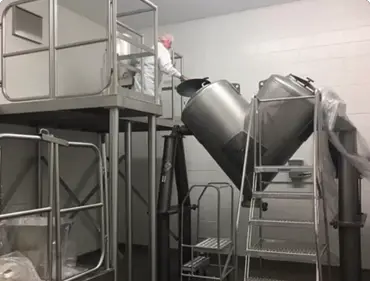When people think of the pharmaceutical industry, they immediately picture a variety of processing equipment like mills, granulators, boilers, capsule fillers, etc. Much of the medicine manufacturing process involves processing different substances to produce medicines. It involves processes like grinding, granulating, drying, heating, cooling, etc. Manufacturers need various equipment to maintain a highly controlled environment to prevent contamination and ensure that the medicines meet the industry standards. Different manufacturers may use different machines based on the type of medicines they produce and the functions that the machines provide.
Types Of Processing Equipment
Agitator
An agitator mixes liquid chemicals, produces a chemical reaction and transfers heat.
Blower
As the name suggests, this processing equipment blows air (warm or cool) on a substance. It helps manufacturers recover solvents and in other processes that require evaporation.
Boiler
A boiler boils the water to produce steam necessary for various processes like drying, sterilizing or purifying.
Capsule Filler
This pharmaceutical equipment fills the capsule shells with medicine. In the hard capsule manufacturing process, the filler opens ready-made, two-piece shells with powder or granules. In the soft capsule manufacturing, the filler envelopes liquid or gel with the shell material that forms a one-piece pill.
Centrifuge
A centrifuge separates different substances from each other through centrifugal force. Substances with differing densities separate from each other due to the force. Manufacturers usually use it to separate liquids from each other or liquids from solids.
Coaters
Tablets usually come out with a strong odor and taste that makes them hard to swallow. A coater coats the tablets to hide the scent and taste. Manufacturers may coat capsules with a sugar film as well.
Cooling Towers
A cooling tower cools liquids and/or condenses the steam.
Chiller
A chiller reduces the temperature quickly.
Dryer
Manufacturers may also use the dryer for processes that involve liquid preparations to dry it into powder or granules. It’s usually used after wet granulation to evaporate the volatile liquid mixed with the granules.
Granulator
A granulator creates granules out of powder before tablet compression or capsule filling. Manufacturers may either use dry granulation through a pneumatic press or wet granulation with a volatile liquid, depending on how reactive the ingredients are.
Heat Exchanger
A heat exchanger transfers heat from one substance to another.
High-Pressure Homogenizer
A high-pressure homogenizer processes liquids through particle size reduction and cell lysis.
Inspection Machine
A technical supervisor inspects the substances throughout the manufacturing process using various inspection machines.
Metal Detectors
Over time, the machinery may breakdown and release metal particles that could contaminate the ingredients. Metal detectors detect impurity and prevent the contaminated substance from going further down the production line.
Mill
A mill grinds the ingredients into fine particles. Manufacturers use the powder to fill capsules or create tablets after granulation. The powdery form makes it easier to measure and mix ingredients.
Mixer
Once the ingredients are pulverized, a mixer or blender blends the powders to get the right ratio. The supervisor measures the ingredients carefully before mixing to get the right mixture. The supervisor may take samples from the mixer to test them.
Oven
An oven provides the necessary heat for processes that require it, e.g drying.
Sifters
Sifters or sieves filter the substances during various processes (usually grinding) to ensure that the particles are of the right size. Mills usually come equipped with sifters.
Tablet Press
This pharmaceutical equipment compresses the powder into solid tablets by applying pressure onto the powder from all sides. They can create pills of different sizes and shapes based on their settings.
Tablet Deduster
Tablets usually come out of the tablet press covered in powder. The deduster cleans the pills before the coating process. The manufacturer may reclaim the dust to make more tablets.
Tanks
Manufacturers use tanks to hold the ingredients before transporting it to used processing equipment for a process. The substances may be in liquid or solid forms.






